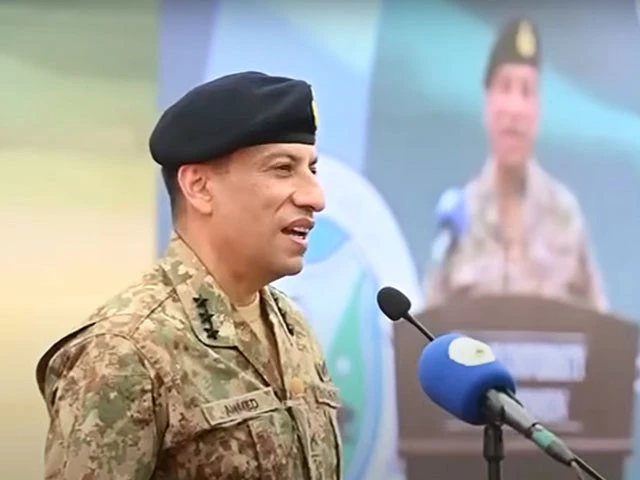He says he doesn’t do covert operations; Pakistan never attacks civilians; Highlights the threat posed by American-made weapons
Director General Inter-Services Public Relations (ISPR) Lieutenant General Ahmed Sharif Chaudhry addresses students at Jinnah University for Women in Karachi on June 17. Photo: Screenshot from ISPR video
ISLAMABAD:
Pakistan’s military on Tuesday vehemently dismissed accusations from Kabul that Islamabad carried out airstrikes on Afghan territory, insisting that Islamabad does not carry out covert cross-border operations or attack civilians.
Speaking to reporters in Rawalpindi, Director General of Inter-Services Public Relations (ISPR) Lieutenant General Ahmed Sharif Chaudhry said allegations leveled by the Afghan Taliban, claiming that Pakistan “bombed” Khost and carried out attacks in Kunar and Paktika, were “baseless and factually incorrect”.
“Whenever we carry out an operation, we announce it openly. In October, when we attacked inside Afghanistan, we informed everyone,” he said.
“Pakistan never attacks civilians. Our problem is not the Afghan people but terrorism. Blood and trade cannot continue together, it cannot happen that we face attacks and continue acting as usual.”
Earlier, the Afghan regime’s spokesperson claimed that Pakistan carried out airstrikes in three provinces, killing civilians.
The claims and counterclaims came amid tensions between Pakistan and the Taliban regime. Pakistan has said its patience has finally run out as Kabul has failed to rein in terror groups, including the banned Tehreek-e-Taliban Pakistan (TTP).
Regarding border management, the DG ISPR said, the army and the Border Corps were effectively securing the border. He referred to talks held in Doha and Istanbul, where Afghan interlocutors had at times threatened to allow “6,000 TTP terrorists to enter Pakistan.” He accused Afghan authorities and militants of pushing anti-Pakistan narratives, including talk of so-called “Greater Pashtunistan”, and warned that senior Afghan officials themselves had issued statements indicating intentions to attack Pakistan.
DG ISPR highlighted the growing threat posed by US-made weapons left behind after the US withdrawal from Afghanistan.
“US weapons were recovered even in the Mianwali terror attack,” he said. “These missiles and weapons have become a threat to the entire world.”
He said the militants were using American bulletproof weapons and vehicles purchased with narcotics money, and that those weapons had been used in 29 terrorist incidents inside Pakistan.
Breaking down the counter-terrorism actions, Lt Gen Chaudhry said 67,000 operations had been carried out since January, 1,387 in Khyber-Pakhtunkhwa and 3,485 in Balochistan. While Balochistan remained the most active front, Punjab and the KP also saw sustained action.
These operations resulted in the death of 210 militants, but caused heavy losses for Pakistan.
“This year, 607 security personnel have been martyred,” he said. “In November alone, 4,910 operations were carried out during which 57 army and FC soldiers embraced martyrdom, including 22 from the army.”
Civilian casualties included 14 people, while 11 of the martyrs were from the Frontier Corps.
The DG ISPR said Pakistan had strengthened border controls, curbing smuggling even for those who previously had permits. He noted that the Balochistan army and government had drastically reduced diesel smuggling from Iran, cutting it by Rs 20.2 billion.
“Stopping smuggling is primarily the responsibility of the provincial government, but we fully support it,” he added. Reiterating Islamabad’s resolve, he said Pakistan would continue to fight terrorism with national unity.
“The war against terrorism has to be won by the army and people of Pakistan. Whatever the nature of this war, Pakistan will prevail.”
Separately, Federal Information Minister Attaullah Tarar revealed that the suicide bomber who attacked the Islamabad District Courts in Sector G-11 on November 11 was an Afghan national. He said the attack was planned in Afghanistan under the supervision of TTP chief Noor Wali Mehsud.
At a news conference, Tarar said the attacker had been identified as Usman Shinwari, a resident of Nangarhar, Afghanistan.
According to the minister, the militants had planned major attacks in Rawalpindi and Islamabad, but the attacker failed to reach any high security area and targeted the first available location on the outskirts of the city.
He said that within 48 hours, the Intelligence Bureau and Counter Terrorism Department arrested four suspects involved in the plot: Sajidullah alias Sheena, Kamran Khan, Muhammad Zali and Shah Munir.
During the briefing, an alleged confessional statement of Sajidullah alias Sheena, declared the main perpetrator, was also shown.
Tarar said Sajidullah had joined the Afghan Taliban in 2015 and received training in multiple camps within Afghanistan. He allegedly transported the attacker and the suicide vest.
The minister claimed that the entire operation was planned in Afghanistan by the TTP emir, Noor Wali Mehsud, acting through his commander Dadullah, who is also present in Afghanistan.




